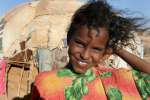Young Somali returnee gets Real Madrid deal
News Stories, 5 August 2004

HARGEISA, Somalia (UNHCR) – Through war, misery, exile and family tragedies, it was a love of football that kept former Somali refugee Abdi Bashir Abdi going.
The payoff for the 17-year-old has exceeded his wildest dreams – he's spending part of the summer in Spain training with one of the world's most successful teams, Real Madrid, alongside his hero, midfielder Zinedine Zidane.
Abdi, a tall, vivacious young man with an infectious smile, is one of four Somali youths chosen for Real Madrid's football summer camp in a programme organised by UN agencies and Real Madrid.
"I am looking forward to more training, meeting other young people from around the world, and also the famous players," Abdi said as he left for the two-week camp. "To me, the training shows what is possible with peace. Without peace, there would be no Real Madrid."
Abdi's extraordinary journey has taken him from Mogadishu during the time of dictator Siad Barre, to Hargeisa (the capital of Somaliland in north-western Somalia), Djibouti, Hartisheik refugee camp in Ethiopia, and finally back to Hargeisa.
His story reflects the difficult recent history of Somalia, and at the same time provides a poignant reminder of the determination and potential of its young citizens.
Abdi's family was originally from Hargeisa, but moved to Mogadishu in the early 1980s, looking for work. Civil strife forced them northwards to Djibouti later in that decade, when Abdi was just a newborn. From Djibouti, his mother and aunt took him to Hartisheik refugee camp, while his father went to Yemen to work. "It was a very difficult time," Abdi remembers, "and I haven't seen my father since then."
The one consolation during his four years in the refugee camp in Ethiopia was that he fell in love with football. "It was hard to be away from home, but I started to play football about this time," he says.
During the years in exile, his mother also died, and he and his aunt moved back to Hargeisa, by then the capital of the self-declared breakaway state of Somaliland, in 1995, when he was eight.
His life since then has been a struggle, as it is for so many young Somalis. He started school, but soon had to drop out because he couldn't pay the school fee of $5 per month – a small sum in the West, but a huge sum in Somalia. He stayed with relatives and took up a cleaning job in their offices, with the promise that he would be trained as a driver. But when his grandfather fell ill, Abdi was instead asked to take care of him full-time.
Once again, he sought refuge in football. "I started playing with the local team at Sheik Mader, and would look forward to the games every day," he recalls.
This year his team entered the 2004 Somaliland Peace Cup competition. The cup was sponsored by UNDP and UNICEF Somalia, as part of the Sports for Peace programme that is one of the pillars of the Somalis for Peace campaign to celebrate this year's International Peace Day in September.
Scoring two goals in the tournament, Abdi earned the prize – one of four places for Somali youth at the Real Madrid camp – because of his strong team leadership and exemplary sportsmanship.
The trip to Spain brought the chance to meet his favourite international player – Zinedine Zidane. "He has an excellent technique, and great skill," Abdi says, his eyes sparkling with excitement. "Also, he has a wonderful temperament, a good reputation, and he never swears or shouts."
Abdi's faith in the power of football is profound. UN security officials in Somalia reported a decrease in militia activity during the month of Euro 2004 earlier this summer, as local warlords and militia laid down their weapons to admire the skills of Zidane, Beckham, Raul and Figo, and the organisation and teamwork of eventual winners Greece.

Could it really be that sport represents a potential vehicle for reconciliation and understanding? "Yes, it is true that everyone wanted to watch Euro 2004, and that no one was interested in fighting," agrees Abdi. "Football can unite people. You can see that with the four of us going to the training camp. Two of us are from Hargeisa, one from Mogadishu and one from Merca. We did not know each other before, but now we are friends, we play together, and we stay together. We hope to keep in touch after the camp."
It's a hopeful sign that the football camp may pay long-lasting dividends for Somalia, a country plagued by violence for more than two decades. Says Abdi: "I want to make the most of the training camp, learn as much as I can, and bring a message of peace, during my time in Spain and when I return."
By Rob Gaylard
UNHCR Somalia


















































